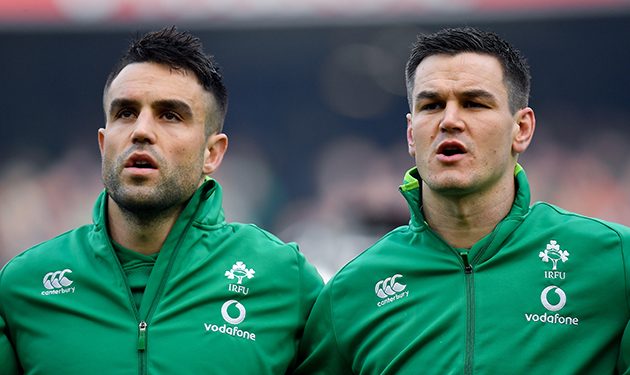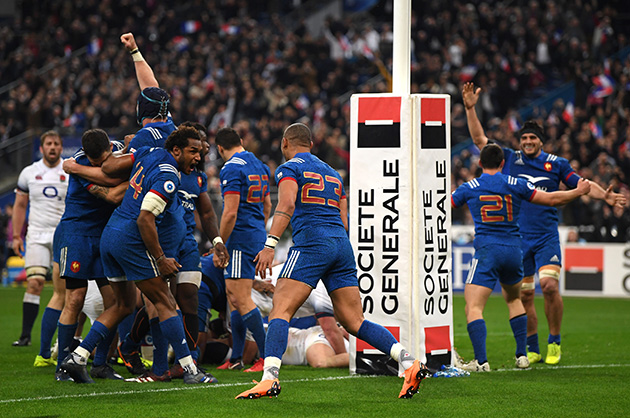From possession masters Ireland to the high quality of Hadleigh Parkes, Paul Williams analyses the latest round of Six Nations action
Six Nations 2018 Round Four – Six things we learnt
Ireland are possession masters
Ireland had 60% of the possession against Scotland. This stat, in isolation, is not that rare. But when you consider that this is the fourth fixture in a row where they have kept the opposition below 38% possession, it creates a pattern.
Ireland are often, and unfairly, labelled a ten-man team, but they aren’t, and certainly weren’t against Scotland. You just need to see the number of Scottish defenders beaten by the Irish back-line to realise that notion is false – 18 defenders beaten by the backs alone is not an indicator of ten-man rugby.
What Ireland play, and play so perfectly, is possession rugby. Successions of neat short carries, where the ball is never further than three yards from at least two ruck-cleaners.

Jump to it: Rob Kearney takes a high ball against Scotland (Getty Images)
Ireland do kick the ball regularly, often ten to 15 times more than the opposition. But as against Scotland, the kicking from Johnny Sexton and Conor Murray is so accurate that their kicking game almost feels as secure as other teams’ passing games.
Add in the incredible aerial performance of Rob Kearney and you have an attacking and defensive kicking system that delivers the ball like a vending machine.
Ireland will get to hold the Six Nations trophy because they hold onto the ball better than anyone else. And unless England can get 50% possession, Ireland will get their hands on a well-deserved Grand Slam too.
Scotland created, but didn’t finish
Scotland may have lost another game on the road. And their supporters may continue to wonder why their home-and-away performances are so schizophrenic. But their display against Ireland proves that Scotland are progressing at a substantial rate.
Scotland could have scored three tries in Dublin. And these weren’t fantastical ‘What if?’ tries. What if we had our full-strength team playing? What if we had a different ref? What if the weather was better? These were: What if one, final, short pass had gone to hand?

Break man: Huw Jones bursts through the Ireland defence (Getty Images)
The truth is Scotland created three or four fantastic opportunities with very little possession. To create such clear-cut chance with less than 40% possession shows how creative and comfortable Scotland have become with ball in hand.
Gregor Townsend has created a high-tempo, rapid offload game where all 15 players are comfortable handling at speed – until, on occasions, when it really matters.
Seeing Huw Jones’s poor pass after his chip kick was like watching Da Vinci finessing the final brush stoke on Mona Lisa’s smile, only for him to slip off his stool and jab the brush through her face.
Scotland will be disappointed, but not despondent.
England are struggling to beat defenders
England were handed their second defeat in a row, with one of the post-match explanations offered by Eddie Jones being that his team lacked power. It seems like an unusual weakness to pick on.
England started with a pack weighing 939kg, which is very heavy for a modern Test pack. That’s reminiscent of the pack weights we saw from international sides between 2007 and 2011. Most Test forwards, collectively, now weigh well under 900kg because speed, particularly in the back row, has been deemed more important than mass.
The English pack that faced France also featured what are essentially three second-rows, a No 8 and a blindside – a selection where power wouldn’t seem an issue.

Stop sign: Elliot Daly can’t escape French tacklers (Getty Images)
However, one aspect of the game where England did look underpowered was in their ability to beat defenders. As against Scotland, the running lines were predictable and lateral movement was non-existent.
The linear nature of the carrying meant that England only beat eight defenders in 80 minutes. The English backs beat just four defenders and the team failed to make a single line break in the opening 40 minutes.
If England are serious about winning the World Cup, their levels of creativity need powering up, or if they are to continue playing as they are then a faster openside must be selected so that they can retain the ball from these predicable running lines.
Eddie Jones has work to do if he plans on beating Ireland in Twickenham.
Ireland v Scotland Talking Points from the Aviva Stadium
The Irish got the win that ultimately won…
France v England Talking Points from Paris
France v England Talking Points from Paris If…
Wales v Italy Talking Points from Cardiff
Talking points from the 38-14 Wales win over…
France do it the hard way
France’s win over England was remarkable. And not merely because they managed to beat the pre-tournament favourites.
France did this the hard way. Beating this current England team is a big task, regardless. Doing it with a scrum completion of 66% and a lineout completion of 54% is harder than a three-day old baguette.
Winning just six lineouts from 11 makes Test rugby almost impossible. It nullifies the benefit of any penalty awarded in your own half and reduces the ability to make 50-metre gains from lineouts to almost zero.

Problem area: France struggled at the lineout against England (Getty Images)
However, whilst France struggled at the set-piece, defensively they were exceptional. They delivered a tackle completion of 95% – magnificent in a game where they had to make 168 tackles.
The victory was made even more remarkable when you consider that Lionel Beauxis, a player selected solely for his kicking, missed touch in the final minutes.
France have a much-needed win and Beauxis has a new anxiety dream.
Hadleigh Parkes quietly doing the business
Hadleigh Parkes delivered another Man of the Match performance for Wales. One try, another disallowed, seven defenders beaten and 11 tackles made – with just one missed.
Those who have watched him play at the Scarlets won’t be surprised by how easily he has fitted into Test rugby. What is surprising is the seemingly lukewarm response that his performances – and indeed selection – have received in Wales.

Star man: Hadleigh Parkes scores the opening try for Wales (Getty Images)
It may be his residency qualification, his age or the fact he has been selected over Welsh favourites such as Jamie Roberts, but Parkes’s performances are worthy of more praise than seems to be forthcoming.
If a fresh-faced 22-year-old centre, born in Wales, had performed as Parkes has, the Welsh nation would be raving about him. You can almost guarantee that there would be a three-minute TV feature on him as he walks his dog along a misty coastal path in South Wales.
Let’s also remember that this is Wales we are talking about, a country where the overhyping of rugby players is a skill taught at birth (I’m Welsh, before the backlash begins).
None of this seems to be bothering Parkes, of course. He carved his way through Italy and is destined to play in the World Cup in 2019.
Fitness is a positive for Italy
It can be difficult to find positives when writing about Italy in the Six Nations. Regular losing margins of between 20 and 25 points rarely contain many upsides. Once again, despite a two yellow-card advantage, and against a radically altered Welsh line-up, they were comprehensively beaten 38-14.

Late show: Mattia Bellini scores Italy’s second try (Getty Images)
But one positive in this game, as in the previous three in the year’s championship, has been their fitness. Italy no longer seem to fade away quite so rapidly in the final 20 minutes, as they have done in recent seasons. Mattia Bellini scored in the final five minutes against Wales and continued a trend where Italy are consistently scoring in the second half – a period in which they have historically fallen away.
This is purely observational and about as scientific as Donald Trump’s views on climate change, but the regularity with which Italy seem to be scoring in the final ten minutes is at least a sign that the squad is Test fit, if not always Test quality.
Don’t forget to follow Rugby World on Facebook, Twitter and Instagram.








